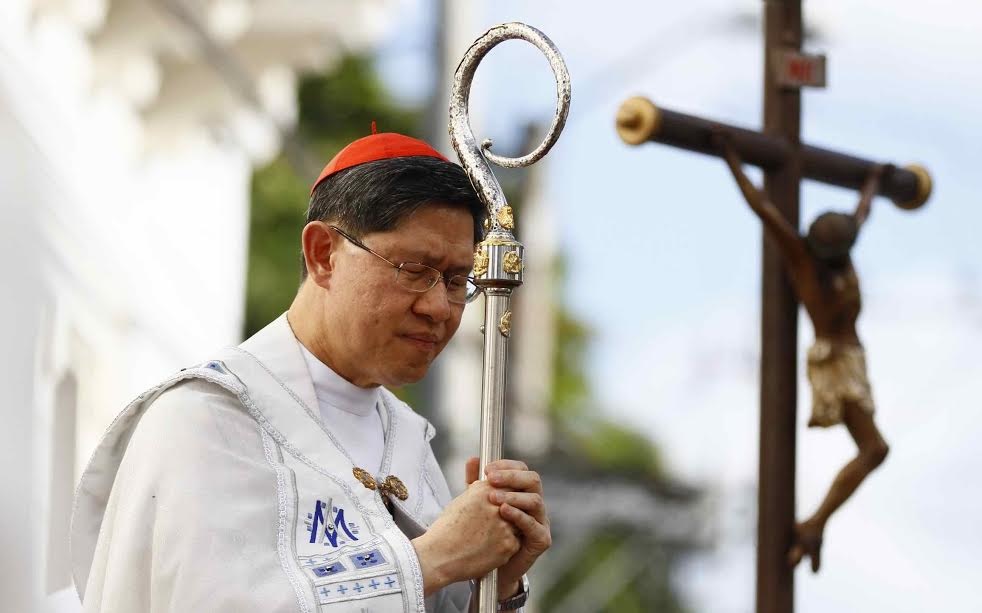MANILA – Some 3,200 drug personalities have died in anti-drug operations from July 1, 2016 to June 20, 2017, according to the latest statistics from the Presidential Communications Office.
The Philippine National Police faces 12,833 homicide cases from July 1, 2016 to June 16, 2017, and has found that 2,098 of them were drug-related and 2,535 were not. At least 8,200 are still under investigation, meaning the motives are still undetermined.
With such enormous numbers, why does it seem like some Catholics accept the killings, despite the Bible explicitly saying, “Thou shalt not kill”?
Manila Archbishop Luis Antonio Cardinal Tagle has some theories. In a press conference on the upcoming Philippine Conference on New Evangelization (PCNE), Tagle on Tuesday acknowledged that some people believed the end justifies the means.
But based on his interviews with people, he said, “Most believe that life is sacred. The Filipino believes that life is sacred. The Filipino believes that killing is wrong.”
Those he talked to said they knew what the teachings were. But, said Tagle, “It seems like it comes from what we can call helplessness.”
“It’s like, ‘How can we solve this? When you go here, it seems like there’s no solution. When you go there, it’s seems like they’re not doing anything. For years our families, our neighborhood, have been plagued by that problem’,” the Manila Archbishop quoted his them as saying.
“It’s not out of moral conviction. It’s more out of despair,” he added.
Perhaps they had been pushed too far, and in their misery, found a brutal solution that they had no other option but to try.
“And I feel sorry for them because it sparks conflict within. A part of them says life is sacred; you should really not destroy it. But another part of them has been through too much suffering. Especially when you talk to parents whose children got hooked on drugs. They’re furious with the people who sold it to their children. They seem so helpless. The institution, the system has not been working for them, so they think, ‘Maybe this is it. This is the solution we’ve been looking for’,” Tagle explained.
He looked forward to discussions at the conference on July 28 to 30 at the University of Santo Tomas, which would offer insights into new approaches to save and promote life. Such concrete programs would complement the call to stop the killings. It was important to be proactive, he added.
Participants may join any of the 10 tracks offered at PCNE, such as the Ecology track, the Youth track, and the New Media track. But surely, said Tagle, the Social Justice track would be able to impart wisdom on the aforementioned issue. One of the sessions, for example, would be “It’s A Beautiful Life: Human Dignity, Reloaded.”
“So I believe that there is still in them respect for life. Perhaps what PCNE can help with is strengthening the faith and keeping the hope alive. Because when we lose hope, as we say, we hold on to just about anything,” Tagle said.
This year’s theme for PCNE is “Of One Heart and Soul.” According to Rev. Fr. Jason Laguerta, director of the Archdiocese of Manila’s Office of the Promotion of New Evangelization, they aimed to look back on the early Christians, who lived as a united community. Catholics of today may have many differences, but they come from the same family, and the same God.
The message they wanted to convey was one of peace in the midst of conflict, of love in the midst of anger and hate, Laguerta said.
The president of Vatican’s Pontifical Council for the Promotion of New Evangelization, Archbishop Salvatore Rino Fisichella, will be attending to deliver the keynote message on “Being Christian in the age of indifference.”
Meanwhile, Archbishop Bernardito Auza, the Permanent Observer of the Holy See to the United Nations, will talk about “The role of the Church among a community of nations.”
To register for PCNE 4, call 405-0093, 0908-1193-533, or 0995-1913-473. E-mail pcne2017@gmail.com, or visit www.pcne.com.ph.

